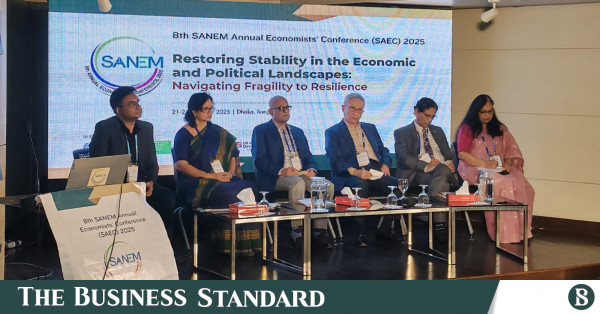Speakers at a panel discussion at the 8th Sanem Annual Economists’ Conference (SAEC) 2025 held in Dhaka on 23 February 2025. Photo: TBS
“>

Speakers at a panel discussion at the 8th Sanem Annual Economists’ Conference (SAEC) 2025 held in Dhaka on 23 February 2025. Photo: TBS
Bangladesh is already in a middle-income trap and must prepare for the post-LDC (Least Developed Country) graduation era, economists warned today during a panel discussion at the 8th Sanem Annual Economists’ Conference (SAEC) 2025 at BRAC Centre Inn in the capital.
The session, titled “Restoring Stability in Bangladesh’s Economic Landscape: Navigating Reform Agendas,” featured prominent experts discussing the country’s pressing economic challenges.
Former lead economist of the World Bank Dhaka Office, Zahid Hussain, stressed that Bangladesh is already in a middle-income trap.
“It goes through several phases. One phase is in the investment and export intensity of the economy. The investment rate has been stagnating recently and slightly declining. The export-to-GDP ratio was steady for some time but then started to drop,” he said.
Zahid also pointed out other critical phases, including inflation, forex reserves, and the debt-to-GDP ratio.
Addressing the role of the International Monetary Fund (IMF), he said, “The amount of IMF money isn’t very large, but I believe the disruption of the funding has impacts beyond just the IMF money. It affects not only the IMF funding but also budget support from the World Bank.”
He added, “It influences risk perceptions, especially the ratings from Moody’s, S&P, and Fitch. This, in turn, directly affects the cost of financing, particularly for trade financing.”
The investment rate has been stagnating recently and slightly declining. The export-to-GDP ratio was steady for some time but then started to drop.
Zahid Hussain, former lead economist of the World Bank Dhaka Office
Raising concerns about the upcoming LDC graduation, Distinguished Fellow of CPD Prof Mustafizur Rahman said, “Imagine a situation where Bangladesh has to pay a 10% duty in some markets, while Vietnam, which currently pays, won’t have to due to its free trade agreement with the European Union.
“This could create a 20% difference. Therefore, it would be wise to prepare and implement sustainable initiatives to ensure that our LDC graduation is successful and sustainable.”
He also warned that nearly 90% of the trade benefits currently enjoyed by the 12 graduating LDCs will be lost by Bangladesh after graduation, as the country is the largest recipient of these benefits. He suggested increasing direct tax collection to offset potential losses from reduced import duties.
KAS Murshid, former director general of the Bangladesh Institute of Development Studies, stressed the importance of low-cost agricultural technology for farmers.
He urged the government to focus on developing new high-yield crop varieties and expanding the use of sustainable farm technologies, such as small-scale mechanisation.
As an example, he cited the successful deployment of two-wheeler tractors in marginal areas and recommended similar initiatives to support agricultural growth.
The session was moderated by Selim Raihan, executive director of Sanem (South Asian Network on Economic Modelling), and featured insights from distinguished panellists, including Prof Sharmind Neelormi of Jahangirnagar University’s Economics Department and Prof Rumana Haque from Dhaka University’s Economics Department.


